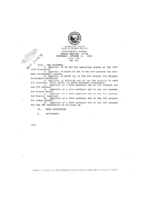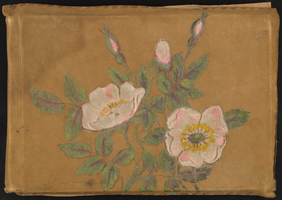Search the Special Collections and Archives Portal
Search Results
Fayle Family Photographs
Identifier
Abstract
The Fayle Family Photographs depict the Fayle Family in Southern Nevada and California from 1888 to 1990. The photographs primarily include family photographs of Leonard Fayle, Anna Louise Trapnell Fayle, Leonard Fayle’s parents George Fayle and Jean Henderson Fayle, Leonard Fayle’s siblings George Arthur Fayle and Jean Nevada Fayle, and Leonard and Anna Fayle’s children Jane and Edward Fayle. The photographs also depict the Nevada towns of Las Vegas, Goodsprings, and Jean, including railroad operations, mining, milling, and hauling freight. The collection includes a leather-bound photograph album containing images of the Fayle Family and the Yount Family.
Archival Collection
Fayle Family Papers
Identifier
Abstract
The Fayle Family Papers (1895-1998) document the family's personal and business interests in Goodsprings, Nevada and Las Vegas, Nevada. The collection contains mining documents, business records, and photographs from Leonard Fayle’s work with the Las Vegas Valley Water District, where he documented reservoirs, dams, and both abandoned and functioning mines. The photographs also include family members, vacations, and Southern Nevada fraternal organization pictures.
Archival Collection
Florence Lee Jones and John Cahlan Papers
Identifier
Abstract
The Florence Lee Jones and John Cahlan Papers (1929-1983) contain material created by the couple related to their work at the
Archival Collection

Meeting minutes for Consolidated Student Senate University of Nevada, Las Vegas, October 11, 1990
Date
Archival Collection
Description
Text

Scrapbook of poetry and other clippings
Date
Archival Collection
Description
Scrapbook of poetry and other clippings
Mixed Content

Charles Scott Emerson oral history interview: transcript
Date
Archival Collection
Description
Oral history interview with Charles Scott Emerson conducted by Claytee D. White on December 21, 2017 for the Remembering 1 October Oral History Project. In this interview, Charles Scott Emerson discusses his work with the American Red Cross and the disaster relief the organization provided during the aftermath of the October 2017 mass shooting in Las Vegas, Nevada. The interview begins with a discussion on Emerson's early life and career in Missouri and how he moved to Las Vegas in 2004. Emerson talks about the American Red Cross response plans and coordinated operations that are in place for when the community is faced with a disaster, going into specific detail on the community-wide response to the October 1, 2017 shooting. He gives a behind-the-scenes glimpse into how relief work is organized, using this interview as a chance to praise the hidden heroes of the October 2017 tragedy, including the people at the Family Assistance Center, the Attorney General's Office, the Driver's License Bureau, and the Coroner's Office, as well as mental health providers, child care workers, blood donors, and more. Throughout the interview, Emerson puts special emphasis on the importance of community in order to offer support in the aftermath of a tragedy as well as to prevent a man-made tragedy from occurring again.
Text

Transcript of interview with Randy Lavigne by Stefani Evans and Clatyee D. White, August 23, 2016
Date
Archival Collection
Description
Randy Lavigne, Honorary AIA, has every reason to smile. Since 1995 she has been the Executive Director for AIA (American Institute of Architects) Las Vegas professional organization; she works daily with her daughter in a beautifully restored historic building in the heart of downtown Las Vegas; and the architects with whom she works so value her contributions they compiled and submitted documentation in order to surprise her with honorary AIA membership. In this interview, Lavigne recalls growing up in segregated Emory Gap, Tennessee, where her grandfather bought all the schoolchildren new shoes every year. She details the cross-country trip that brought her to Las Vegas in 1994 and eventually to the AIA in 1995. The bulk of the interview focuses on the building where the AIA is housed and the history of the organization. In 2008 the AIA moved from its former home at UNLV’s School of Architecture to the historic Fifth Street School in downtown Las Vegas. Lavigne discusses the history of the building and its significance to the City of Las Vegas. She reveals plans to examine the architectural history Las Vegas to celebrate the AIA Chapter’s sixtieth anniversary. She also talks about diversity in the profession, the process of licensure, publications, continuing education, organizational records, and the now-defunct auxiliary organization, the Architects' Wives League.
Text

Interview with William Gus Flangas, November 12, 2004
Date
Archival Collection
Description
Text

Interview with Harrie Fox Hess, March 5, 2005
Date
Archival Collection
Description
Text

Dr. Alvaro Vergara-Mery oral history interview: transcript
Date
Archival Collection
Description
Oral history interview with Dr. Alvaro Vergara-Mery conducted by Barbara Tabach on October 28, 2020 for the Latinx Voices of Southern Nevada Oral History Project. Alvaro discusses his personal history and his upbringing in both Chile and the United Kingdom before immigrating to the United States; due to political unrest in Chile, he moved to the U.K. where his mother was born before attending university in the United States. Alvaro talks about his work as a medical interpreter for University Medical Center (UMC) as well as his college teaching experience at University of Nevada Las Vegas and California State Berkley.
Text
